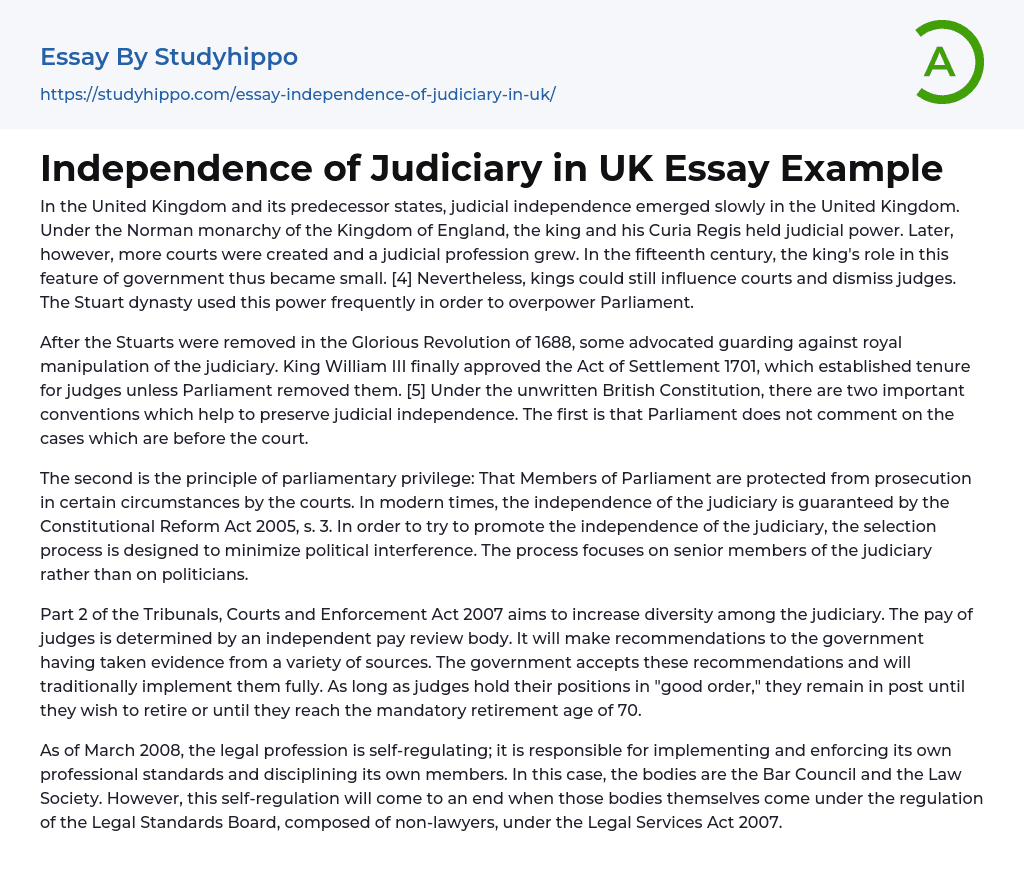In the United Kingdom and its predecessor states, judicial independence emerged slowly in the United Kingdom. Under the Norman monarchy of the Kingdom of England, the king and his Curia Regis held judicial power. Later, however, more courts were created and a judicial profession grew. In the fifteenth century, the king's role in this feature of government thus became small. [4] Nevertheless, kings could still influence courts and dismiss judges. The Stuart dynasty used this power frequently in order to overpower Parliament.
After the Stuarts were removed in the Glorious Revolution of 1688, some advocated guarding against royal manipulation of the judiciary. King William III finally approved the Act of Settlement 1701, which established tenure for judges unless Parliament removed them. [5] Under the unwritten British Constitution, there are two important conventions which help to preserve judicia
...l independence. The first is that Parliament does not comment on the cases which are before the court.
The second is the principle of parliamentary privilege: That Members of Parliament are protected from prosecution in certain circumstances by the courts. In modern times, the independence of the judiciary is guaranteed by the Constitutional Reform Act 2005, s. 3. In order to try to promote the independence of the judiciary, the selection process is designed to minimize political interference. The process focuses on senior members of the judiciary rather than on politicians.
Part 2 of the Tribunals, Courts and Enforcement Act 2007 aims to increase diversity among the judiciary. The pay of judges is determined by an independent pay review body. It will make recommendations to the government having taken evidence from a variety of sources. The government accepts these recommendations and will
traditionally implement them fully. As long as judges hold their positions in "good order," they remain in post until they wish to retire or until they reach the mandatory retirement age of 70.
As of March 2008, the legal profession is self-regulating; it is responsible for implementing and enforcing its own professional standards and disciplining its own members. In this case, the bodies are the Bar Council and the Law Society. However, this self-regulation will come to an end when those bodies themselves come under the regulation of the Legal Standards Board, composed of non-lawyers, under the Legal Services Act 2007.
- Federal government essays
- Armed Forces essays
- Confederate States Of America essays
- Federal Government Of The United States essays
- Fourteenth Amendment To The United States Constitution essays
- Governance essays
- Parliament essays
- Politics essays
- Jurisdiction essays
- Bureaucracy essays
- Separation Of Powers essays
- Congress essays
- President essays
- United States Congress essays
- Non-Commissioned Officer essays
- Appeal essays
- Revenge essays
- Corporate Governance essays
- Public Service essays
- Income Tax essays
- Supply essays
- Red Cross essays
- Democracy essays
- State essays
- Liberty essays
- Absolutism essays
- Reform essays
- Republic essays
- John Marshall essays
- Bourgeoisie essays
- Developed Country essays
- Elections essays
- International Relations essays
- Left-Wing Politics essays
- Monarchy essays
- Political Corruption essays
- Political Party essays
- Political Science essays
- Sovereign State essays
- United Nations essays
- World Trade Organization essays
- Contras essays
- Dictatorship essays
- Foreign policy essays
- Monarch essays
- Corruption essays
- Foreign essays
- Democratic Party essays
- European Union essays
- President Of The United States essays




